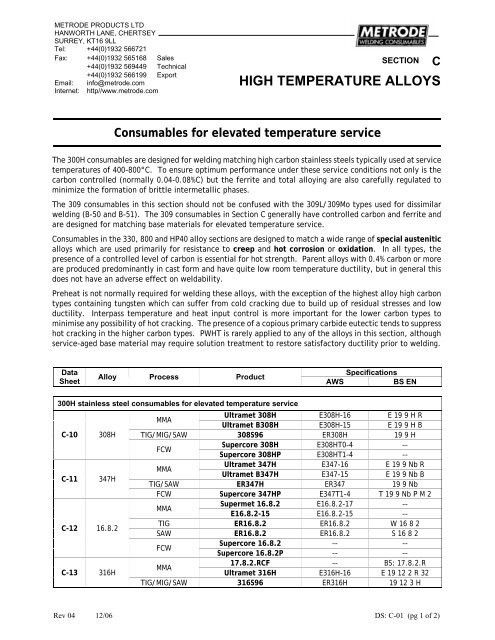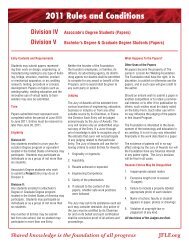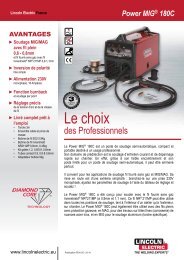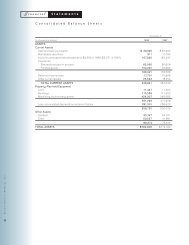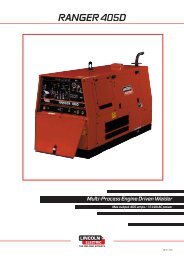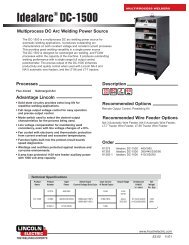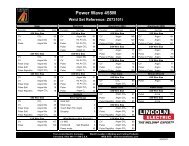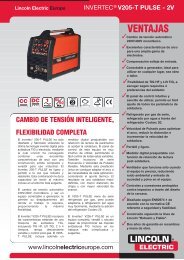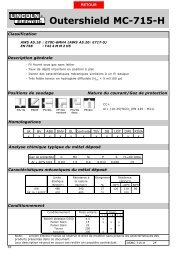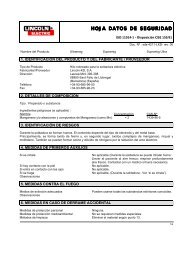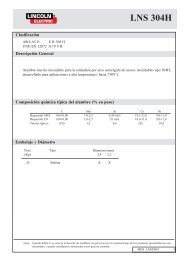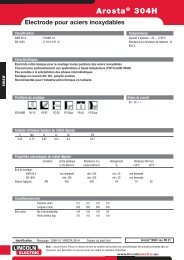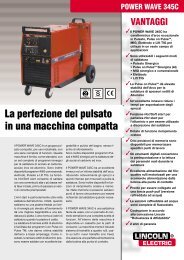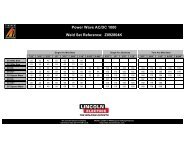- Page 2 and 3:
0.5%Mo CREEP RESISTING STEEL Alloy
- Page 4 and 5:
CMo Product description Copper coat
- Page 6 and 7:
General Data for all 1¼Cr-½Mo Ele
- Page 8 and 9:
CHROMET 1X (continued) All-weld mec
- Page 10 and 11:
LA121 FLUX (continued) Typical oper
- Page 12 and 13:
General Data for all 2¼Cr-1Mo Elec
- Page 14 and 15:
CHROMET 2X (continued) All-weld mec
- Page 16 and 17:
LA121 FLUX (continued) Typical oper
- Page 18 and 19:
CHROMET 1V Basic coated MMA electro
- Page 20 and 21:
DATA SHEET A-15 METRODE PRODUCTS LT
- Page 22 and 23:
5CrMo Solid TIG and MIG wire for 5%
- Page 24 and 25:
DATA SHEET A-16 METRODE PRODUCTS LT
- Page 26 and 27:
9CrMo Product description Solid cop
- Page 28 and 29:
P91 - MODIFIED 9CrMo Alloy type Mod
- Page 30 and 31:
Chromet 9-B9 MMA electrode meeting
- Page 32 and 33:
9CrMoV-N (continued) Parameters TIG
- Page 34 and 35:
Supercore F91 All-positional flux c
- Page 36 and 37:
CHROMET 10MW MMA electrode for E911
- Page 38 and 39:
12CrMoV CREEP RESISTING STEEL Alloy
- Page 40 and 41:
12CrMoV Product description Solid w
- Page 42 and 43:
Chromet 92 MMA all-positional elect
- Page 44 and 45:
LA491 Flux (continued) Sub-arc flux
- Page 46 and 47:
Chromet 23L MMA all-positional elec
- Page 48 and 49:
CONSUMABLES FOR WB36 Alloy type WB3
- Page 50 and 51:
MnMo Product description Solid copp
- Page 52 and 53:
METRODE PRODUCTS LTD HANWORTH LANE,
- Page 54 and 55:
TUFMET 1Ni.B 1%Ni MMA electrode for
- Page 56 and 57:
METCORE DWA 55E Ni alloyed all-posi
- Page 58 and 59:
TUFMET 2Ni.B 2.5%Ni MMA electrode f
- Page 60 and 61:
METRODE PRODUCTS LTD HANWORTH LANE,
- Page 62 and 63:
General Data for all MMA Electrodes
- Page 64 and 65:
MnMo Product description Solid copp
- Page 66 and 67:
General Data for all MMA Electrodes
- Page 68 and 69:
TUFMET 3NiMo All-positional MMA ele
- Page 70 and 71:
METRODE PRODUCTS LTD HANWORTH LANE,
- Page 72 and 73:
1NiCu.B MMA electrode for welding C
- Page 74 and 75:
METRODE PRODUCTS LTD HANWORTH LANE,
- Page 76 and 77:
General data for all 410 MMA electr
- Page 78 and 79:
12Cr Product description Solid wire
- Page 80 and 81:
13.4.Mo.L.R Rutile MMA electrode fo
- Page 82 and 83:
SUPERCORE 410NiMo Flux cored wire f
- Page 84 and 85:
General Data for all MMA Electrodes
- Page 86 and 87:
FV520B (continued) Typical operatin
- Page 88 and 89:
� General Data for all 308L MMA E
- Page 90 and 91:
ULTRAMET B308L (continued)� All-w
- Page 92 and 93:
SUPERCORE 308L, 308LP Rutile flux c
- Page 94 and 95:
General Data for all 347 MMA Electr
- Page 96 and 97:
347S96 (continued) Typical operatin
- Page 98 and 99:
� General Data for all 316L MMA E
- Page 100 and 101:
ULTRAMET B316L (continued) � Comp
- Page 102 and 103:
SUPERCORE 316L, 316LP Rutile flux c
- Page 104 and 105:
NON-MAGNETIC 316L Alloy type Nil-fe
- Page 106 and 107:
ULTRAMET B316NF Basic all-positiona
- Page 108 and 109:
SUPERCORE 316NF Rutile flux cored w
- Page 110 and 111:
SUPERMET 318 Nb stabilised Mo-beari
- Page 112 and 113:
317L STAINLESS STEEL Alloy type 19%
- Page 114 and 115:
ER317L Product description Solid wi
- Page 116 and 117: CRYOGENIC 308LCF CONSUMABLES� All
- Page 118 and 119: ULTRAMET B308LCF Basic coated MMA p
- Page 120 and 121: SUPERCORE 308LCF Rutile all positio
- Page 122 and 123: � General Data for all 316L MMA E
- Page 124 and 125: ER316LCF Product description Solid
- Page 126 and 127: CONSUMABLES FOR 904L Alloy type 904
- Page 128 and 129: ULTRAMET B904L (continued) All-weld
- Page 130 and 131: E825L-15 Product description MMA el
- Page 132 and 133: CONSUMABLES FOR 310L Alloy type Low
- Page 134 and 135: ELECTRODE FOR 310MoLN Alloy type 25
- Page 136 and 137: METRODE PRODUCTS LTD HANWORTH LANE,
- Page 138 and 139: General Data for all 309L MMA Elect
- Page 140 and 141: ULTRAMET B309L (continued) � All-
- Page 142 and 143: SUPERCORE 309L, 309LP Rutile flux c
- Page 144 and 145: SUPERMET 309Mo General purpose ruti
- Page 146 and 147: ER309Mo Product description Solid w
- Page 148 and 149: METRODE PRODUCTS LTD HANWORTH LANE,
- Page 150 and 151: General Data for all 22%Cr Duplex M
- Page 152 and 153: 2205XKS (continued) Composition C M
- Page 154 and 155: SUPERCORE 2205, 2205P (continued) O
- Page 156 and 157: Storage Fume data General Data for
- Page 158 and 159: SSB FLUX Sub-arc flux Product descr
- Page 160 and 161: 25%Cr SUPERDUPLEX - 2507 Alloy type
- Page 162 and 163: ULTRAMET 2507 Rutile all-positional
- Page 164 and 165: 25%Cr SUPERDUPLEX WITH 2%Cu Alloy t
- Page 168 and 169: Data Sheet Alloy Process Product Hi
- Page 170 and 171: ULTRAMET 308H Rutile electrode for
- Page 172 and 173: 308S96 Solid wire for 304H stainles
- Page 174 and 175: 347H STAINLESS STEEL Alloy type Con
- Page 176 and 177: ULTRAMET B347H Basic pipe-welding e
- Page 178 and 179: SUPERCORE 347HP All-positional ruti
- Page 180 and 181: SUPERMET 16.8.2 Rutile electrode fo
- Page 182 and 183: ER16.8.2 Solid wire TIG and SAW for
- Page 184 and 185: 316H TYPE CONSUMABLES Alloy type Fo
- Page 186 and 187: ULTRAMET 316H Rutile coated MMA ele
- Page 188 and 189: DATA SHEET C-20 METRODE PRODUCTS LT
- Page 190 and 191: CONTROLLED FERRITE 309 Alloy type 2
- Page 192 and 193: 309S94 Product description Solid wi
- Page 194 and 195: 310 STAINLESS STEEL Alloy type 25%C
- Page 196 and 197: ULTRAMET B310Mn All-positional basi
- Page 198 and 199: 310H ELECTRODE TO MATCH HK40 Alloy
- Page 200 and 201: DATA SHEET C-40 METRODE PRODUCTS LT
- Page 202 and 203: 21.33.MnNb Solid TIG welding wire f
- Page 204 and 205: THERMET R17.38H Product description
- Page 206 and 207: THERMET 25.35.Nb Product descriptio
- Page 208 and 209: THERMET HP40Nb Basic electrode matc
- Page 210 and 211: HIGH CARBON 35Cr-45Ni-1Nb Alloy typ
- Page 212 and 213: HIGH CARBON 25Cr-35Ni-WCo Alloy typ
- Page 214 and 215: DATA SHEET C-80 METRODE PRODUCTS LT
- Page 216 and 217:
SPECIAL ELECTRODE FOR IN-657 Alloy
- Page 218 and 219:
METRODE PRODUCTS LTD HANWORTH LANE,
- Page 220 and 221:
NICKEL BASE 182 CONSUMABLES Alloy t
- Page 222 and 223:
NIMROD 182 (continued) All-weld mec
- Page 224 and 225:
NICKEL BASE AB CONSUMABLES Alloy ty
- Page 226 and 227:
NIMROD AB (continued) All-weld mech
- Page 228 and 229:
METRODE PRODUCTS LTD HANWORTH LANE,
- Page 230 and 231:
General Data for all MMA Electrodes
- Page 232 and 233:
62-50 Product description Solid wir
- Page 234 and 235:
General Data for all C276 Electrode
- Page 236 and 237:
HAS C276 Product description Solid
- Page 238 and 239:
NIMROD 59KS Basic all-positional pi
- Page 240 and 241:
CORROSION RESISTANT ALLOY C22 Alloy
- Page 242 and 243:
HAS C22 Product description Solid w
- Page 244 and 245:
NIMROD 617KS 617 MMA electrode for
- Page 246 and 247:
METRODE PRODUCTS LTD HANWORTH LANE,
- Page 248 and 249:
NIMROD 200Ti (continued) Operating
- Page 250 and 251:
NIMROD 190 Nickel-copper MMA electr
- Page 252 and 253:
CUPRONICKEL ALLOYS Alloy type 70/30
- Page 254 and 255:
70CuNi (continued) All-weld mechani
- Page 256 and 257:
NIMAX B2L High molybdenum nickel ba
- Page 258 and 259:
METRODE PRODUCTS LTD HANWORTH LANE,
- Page 260 and 261:
PURE NICKEL FOR CAST IRON Alloy typ
- Page 262 and 263:
CI CAVITY FILL Ni Pure nickel MMA e
- Page 264 and 265:
NICKEL-IRON FOR CAST IRON Alloy typ
- Page 266 and 267:
CI-MET NiFe (continued) Composition
- Page 268 and 269:
ARMET 1 Rutile MMA electrode for we
- Page 270 and 271:
307 FOR DISSIMILAR WELDS Alloy type
- Page 272 and 273:
19.9.6Mn All-positional rutile coat
- Page 274 and 275:
29.9 DISSIMILAR WELD METALS Alloy t
- Page 276 and 277:
312S94 Product description Solid wi
- Page 278 and 279:
METRODE PRODUCTS LTD HANWORTH LANE,
- Page 280 and 281:
METRODE PRODUCTS LTD HANWORTH LANE,
- Page 282 and 283:
ALLOY C Alloy type Alloy C is a Ni-
- Page 284 and 285:
NIMAX C High recovery alloy C elect
- Page 286 and 287:
METHARD 350 (continued) Operating p
- Page 288 and 289:
METHARD 650 Product description Rut
- Page 290 and 291:
METRODE PRODUCTS LTD HANWORTH LANE,
- Page 292 and 293:
METHARD 850 MMA electrode producing
- Page 294 and 295:
METRODE PRODUCTS LTD HANWORTH LANE,
- Page 296 and 297:
METRODE PRODUCTS LTD HANWORTH LANE,
- Page 298 and 299:
METRODE PRODUCTS LTD HANWORTH LANE,
- Page 300 and 301:
ER70S-2 Mild steel TIG wire Product
- Page 302 and 303:
METCORE DWA 50 All-positional CMn r
- Page 304 and 305:
METRODE PRODUCTS LTD HANWORTH LANE,
- Page 306 and 307:
METRODE PRODUCTS LTD HANWORTH LANE,
- Page 308 and 309:
METRODE PRODUCTS LTD HANWORTH LANE,


